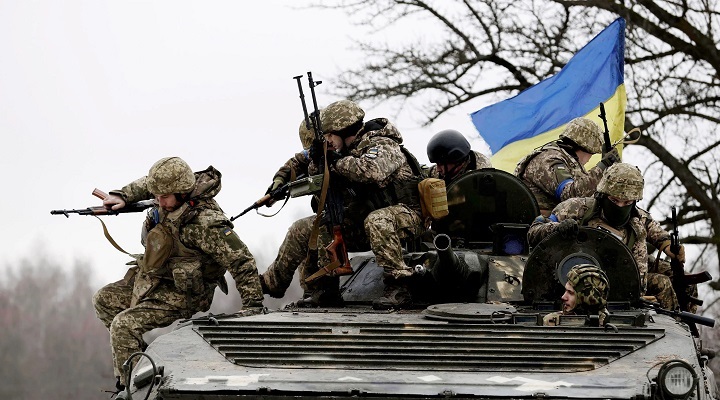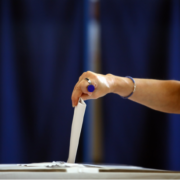
Few in Washington seem overly worried about the apparent stalemate in Ukraine, where Kyiv’s forces can’t break through Russia’s fortified defenses. Meanwhile, America is entirely concentrated on the latest from China – complex malware reportedly able to cripple US cyber systems.
According to The New York Times, which broke the story: “The discovery of the malware has touched off a series of Situation Room meetings in the White House in recent months, as senior officials from the National Security Council, the Pentagon, the Homeland Security Department, and the nation’s spy agencies attempt to understand the scope of the problem and plot a response. The US government and Microsoft have attributed the recent malware attack to Chinese state-sponsored actors, but the government has not disclosed why it reached that conclusion. There is debate among different arms of the US government about the intent of the intrusions, but not their source.”[1]
These developments may not be extraordinary. Chinese cyber capabilities have been spotted for years. However, an alarm of this level could switch many priorities, and an intentional threat to United States territory can spin the situation in a new direction, casting a long shadow on the war in Ukraine. It may make sense of something quite odd there.
Fights on the River Hong
In the Battle of the River Hong in 638 BC, Duke Xiang of Song was ready to battle against the Chu troops crossing the river. The Song general Ziyu wanted to attack when the Chu were in disarray at the crossing, but Duke Xiang refused, thinking it was unfair. Song waited for the Chu forces to array and attack. Song lost the battle, and the duke lost his life.
The combat went down in Chinese history as a stupid military mistake of Song that changed the course of history.
In the past few weeks, CIA director William Burns has reportedly called on his Russian counterparts saying the US had nothing to do with Prigozhin’s June 23 mutiny.
Politico says, “The US reached out to Russia at a critical moment to ensure there was no confusion about its lack of involvement.”[2]
Moreover, The New York Times reported that[3] the US advised Ukraine not to take advantage of the confusion caused by Prigozhin to attack Russia.
Why so? Shouldn’t Ukraine take advantage of the Russian confusion and push harder before Russia gets its house in order and its troops arrayed for battle?
Is Burns like the Duke of Song, or does he have other, more subtle plans?
NBC and The Guardian averred there had been secret talks between the US and Russia right at the time of the mutiny, and Washington didn’t want to compromise that progress.[4]
Historian and strategist Edward Luttwak is even more explicit: “Unmistakable signals have been issued from the Kremlin that Putin is finally ready to consider a compromise. The final party longing for an end to the debacle is the US. Last week, CIA head William J. Burns hurriedly called his Kremlin counterpart, Sergey Yevgenyevich Naryshkin, to reassure him that the US had nothing to do with Prigozhin’s march to Moscow. That phone call is as good evidence as any that, contrary to foolish Leftist fantasies, the Biden administration (fully backed by most Republicans) does not want Russia destabilized by this war. For it knows only too well that Russian power alone keeps the Chinese from absorbing the vast spaces of Mongolia, Kazakhstan, the Kyrgyz Republic, Uzbekistan, and Tajikistan — and that Russian weapons still flow to the only countries that fight the Chinese in recurring incidents: India on land and Vietnam at sea.”[5]
There is, in fact, a consensus about the ongoing talks, so much so that the conservative Gatestone Institute criticizes it: “In public, US President Joe Biden is keen to give the impression that he is fully committed to backing Ukraine’s battle for survival. But it is a different story behind-the-scenes, where Biden and his senior officials are more interested in ending the war in good time for next year’s US presidential election contest. Consequently, rather than upsetting the Kremlin by openly backing Ukraine’s NATO membership bid, the Biden administration’s real objective is to explore possible options for ending hostilities this year. Biden’s obsession with ending the conflict helps to explain the recent initiative undertaken by a delegation of high-ranking US foreign policy experts and former national security officials to hold secret talks with Russian Foreign Minister Sergey Lavrov in New York in April. The aim of the meeting was to lay the groundwork for negotiations to end the war in Ukraine. Among the subjects discussed were some of the thorniest issues of the conflict, such as the fate of Russian-occupied territory such as Crimea that Ukrainian forces have not been able to liberate.”[6]
Tactics and Strategy
There are tactical reasons for that; the Ukrainian army is being depleted, and it would need more significant help: more airplanes, new equipment, and possibly also fresh forces to move to the front. Besides that, there is the American concern that an utter Russian defeat could trigger the collapse of Russia. Its fragmentation could entail dangerous consequences. First, Russian nuclear warheads and missiles could be lost in the total disarray. Some warheads could end up in the hands of crazy terrorists in Africa or other parts of the world.
Then there is a strategic factor: America would like to flip Russia against China. Russia could be agreeable to the proposition as it may fear losing its clout in the Far East and Central Asia to China.
It creates the possibility of China being surrounded by hostile forces in the next few months, which could have massive domestic repercussions in Beijing.
The war in Ukraine, China’s initial support, and Russia’s strategic defeat in Ukraine generate a dire situation for Beijing.
China has been supporting Russia rhetorically and also with some equipment. China’s aid was useful but not a game-changer.
Still, a more significant commitment would have alienated entirely the Western world that buys all of China’s trade surplus, and therefore it could have cost China far more than its return.
Besides, supporting Russia fully in this war would also be dangerous because China is not an active party in the war; Russia is leading it. So, at best, China would be rowing for Russia while Russia firmly holds the rudder and decides what to do with the combat. China would be politically kidnapped by Russia for its motives — a risky proposition for Beijing.
On the other hand, leaving Russia completely alone creates new difficulties because it could hasten Russia’s defeat, making life harsher for China, and it could quicken Moscow’s decision to flip against Beijing.
In this situation, the mistake was all about what happened at the beginning, sealing a friendship treaty with Russia and initially supporting the Ukrainian invasion rather than keeping neutral and aloof, distancing itself from the conflict.
China’s initial support now creates an impossible situation in which whatever move China makes will backfire.
Beijing is in the middle of impossible political choices. It cannot side with Russia, which is possibly going to turn against China soon; it cannot leave Russia alone because it would accelerate the turn.
China can think of tricks and clever ways to try to delay the endgame, but all in all, perhaps, if it wants to get out of the corner, it has to deeply rethink its foreign policy.
Russians and Americans privately say that the basic agreement of the ongoing talks is mutual, although there are different concerns about China. The United States may want to avoid the collapse of Russia after a possible humiliating defeat in the Ukrainian war.[7]
This strategic assessment does not make finding accommodation in the war theater easier. Here Ukrainians may fear being deprived of a victory that belongs to them after a year and a half of bloodshed and devastation.
It’s not easy to convince Ukraine to give up now after so much sacrifice, even though a total victory on the battlefield could be difficult to attain. Families have lost their homes, friends, brothers, and sisters; life can be about ensuring the enemy will not return.
Here is also another element to consider. The seeds of World War II were sown in Italy, Japan, and Germany. Italy and Japan were on the right side during World War I, but both felt betrayed by what they gained in the peace treaties and soon started to claim more than what had been allotted to them.
A victory that doesn’t convince Ukrainians to stay out of future Russian recriminations or a peace that feeds Russia’s future thirst for revenge could prepare for another, much bloodier war in Europe in ten or 20 years. Therefore, at this point, it is essential to end the war and find a peace balance that can last — and will not patch up whatever results to move to fight something else in Asia against China with only half-baked preparations.
Lastly, Europe can live without peace in Ukraine. It has absorbed the various economic and commercial shocks of war. The fight in Ukraine has become slightly different from the decade-long fight in Yugoslavia, 20 years ago.
But peace in Ukraine is necessary also to try to find a solution with China and for China to start some rethinking. Ongoing fights in the West breed fears and tensions in the East almost naturally. If the war continues, it is all unsettled and unsettling for everybody, including Beijing.
In this labyrinth of opposing forces, it is tough to find a balance. It’s essential to make Ukraine conscious that as the West took on the massive burden to support it in its formidable fight against Russia, so must Ukraine understand the global situation around the war and help to find a solution.
Moreover, Russia must understand peace can’t be just a respite in its 19th-century imperial ambitions. Moscow needs to reconsider its history and find a new path for its future. Russia’s new direction is more critical than whatever compromise is reached on the battlefield.
This might happen or might not. Realistically it might not impact the overall assessment, especially after the malware affair. Wars are fought with odd bedfellows. In World War II, the capitalist Western countries fought with the anticapitalist Soviets against their common fascist threat. The Cold War against the USSR was won with the help of radical Islamists and China.
In both cases, the USSR had a brief love affair with Hitler with the invasion of Poland, and China was under Moscow’s spell for a long decade. If China now poses a real, massive threat to the US, Washington could be entitled to switch priorities and seek support from Russia, which is also concerned about Chinese encroachment on its home turf. If it happens, it could turn the tables not only in Ukraine but also in the rest of the world.
[1] https://www.nytimes.com/2023/07/29/us/politics/china-malware-us-military-bases-taiwan.html
[2] https://www.politico.com/news/2023/06/28/biden-russia-wagner-00104098
[3] https://www.nytimes.com/2023/06/29/us/politics/biden-ukraine-russia-rebellion.html
[4] https://www.nbcnews.com/news/world/former-us-officials-secret-ukraine-talks-russians-war-ukraine-rcna92610 and https://www.theguardian.com/us-news/2023/jul/07/russia-us-talks-ukraine-war-biden
[5] https://unherd.com/2023/07/why-no-one-can-end-the-ukraine-war/
[6] https://www.gatestoneinstitute.org/19824/biden-deal-russia-ukraine
[7] See http://www.settimananews.it/informazione-internazionale/sino-american-glacial-thaw/






In earlier times taking land from neighbors provided a state with more tax revenue, in the nineteenth century there were also the coal and iron ore mines and their industries, think of Alsace Lorraine as a prime example. In the twentieth century there were more industries, think of the French contribution of aircraft engines to the German war effort in WWII.
Since 1945 many wars served to free countries from colonial rule and there were a few other reasons for mostly very short wars. But now economic relations are much more complex with long supply lines through many countries for many of the products of modern industry. The former advantages of wars do not compensate for the disturbing effects on those supply lines. So in most cases it makes more sense to buy what one needs instead of going out to militarily capture the producers.
But US saw itself as the natural hegemon over the whole world and especially after 1991. It has by far the most expensive military in the world and it can buy what its needs as it owns the world’s reserve currency and so can create money out of thin air.
It organized coups to install its friends in many countries, mostly military dictators. And every ten years or so it threw a small country against the wall it maintain discipline among the others. It introduced the concept of the ‘International Liberal Rules Based Order’ to have more rules to choose between. Crimea cannot be cut out of Ukraine because it is not allowed to change the borders of another country. Kosovo can be cut out of Serbia because the majority of the people are Albanians. The Northern part of Kosovo cannot be cut out of Kosovo, you are not allowed to change the borders of another country, despite the fact that the majority of the people are Serbs.
It extended NATO in Europe not because there was a military need but to increase the market for its military-industrial complex, the main branch of industry it didn’t export to Asia. And when Russia felt threatened, when US built Aegis ashore installations in Poland and Romania against non-existent Iranian missiles, and by building a Ukranian army larger than that of Türkiye and Russia wanted to have treaties that provided security for all European countries in December 2021 US and NATO refused to consider them.
So now we have a war in which Ukraine is deficient in manpower, artillery, munition for the artillery, aircraft, air defense and a lot more. Russia is operating very carefully to avoid large personnel losses and to avoid if possible NATO intervention.
China would have been helping Russia if it were be necessary because if Russia were to loose US would be stronger in its effort to maintain control over the Chinese island Taiwan just as Russia will support China because it wants its support against US, if necessary.
Speculation about a war between Russia and China is sheer BS as it is much more economical to buy from the other what one wants than to fight over it and leave US the laughing third party. Indeed if the US would loose much of its military power all countries can reduce their spending on their armed forces and spend more on the multitude of other problems that need to be tackled.